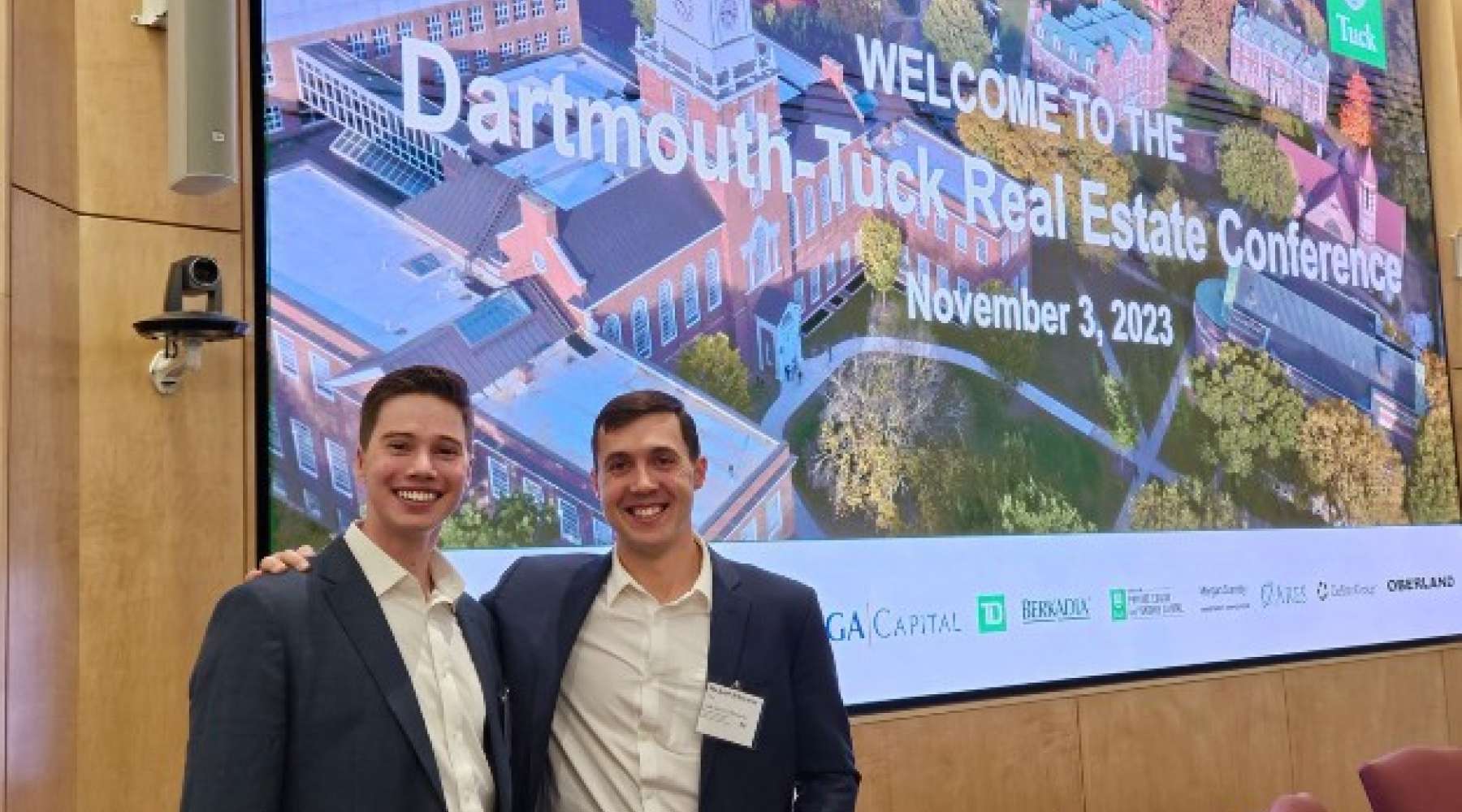
On Friday, November 3, the Tuck School of Business at Dartmouth hosted the Dartmouth-Tuck Real Estate Conference. The day-long event, followed by a lively happy hour, brought together alumni, industry leaders, and students to discuss the latest trends, insights, and challenges in the dynamic world of real estate. Michael Schwarze T’24, Tuck Real Estate Club co-chair and conference organizer, delves into the behind-the-scenes aspects of organizing the conference with Rob Leet T’24. He also discusses the conference’s tremendous support received from alumni, volunteers, faculty and alumni advisers, the conference results, and exciting plans for its future.

In early 2023, Rob and I began discussing a potential real estate conference to bring together alumni from both Dartmouth and Tuck who work in real estate. We saw successful real estate conferences at Wharton and HBS, and thought we could do something similar at Tuck. Fortuitously, Rob and I were approached by two alumni, Chelsea Mandel D’15 and Tony Moody D’92, who were inspired by Tuck’s PEVC Conference in February and wanted to start something similar for real estate. Chelsea and Tony were much deeper in the process than we were, and we loved the idea of making the conference inclusive of both Dartmouth and Tuck. From Rob’s and my perspective, we thought the conference provided multiple benefits:

Organizing the Dartmouth-Tuck Real Estate Conference began in March 2023, which set the stage for months of meticulous planning, collaboration, and hard work. We started by first solidifying the conference team, which contained myself, Rob Leet T’24, Tony Moody D’92, Chelsea Mandel D’15, Brian Melzer, Tuck real estate professor, Alison Martin, PEVC Center program manager, and Mark Hardie PEVC Center director. Additionally, we had several amazing T’24s and T’25s who provided support throughout the day during the conference.
We then started the conference planning. The process involved several components: assembling a diverse lineup of panelists, keynote speakers, and moderators; securing sponsorships to cover costs; and developing a marketing strategy.
Over the summer, the organizing team, led by Rob Leet T’24 and I, devoted considerable effort to business development, reaching out to potential sponsors and building partnerships to ensure the financial success of the event. This endeavor not only honed our salesmanship skills but also provided valuable insights into budgeting and resource allocation, crucial aspects of arranging a large-scale conference. Ultimately, Rob and I were able to secure 11 sponsors from firms who strongly believed in the cause and ultimately provided the necessary financing to allow for this conference to happen. We’re incredibly thankful for their support.
Marketing and communication also took center stage during the planning phase. We worked tirelessly to build a user-friendly and aesthetically pleasing conference website, announce the event on various social media platforms, and send out targeted email invitations to engage the Dartmouth and Tuck Real Estate alumni. This multifaceted approach helped reach diverse audiences across geographies, functions, and age groups.
The conference agenda was curated to offer a diverse and insightful program, covering topics from value-add development to real estate technology. Panel discussions, keynote addresses, fireside chats, and general networking provided a variety of ways for attendees to stay engaged, and the panels were limited to 45 minutes—which we realized was the optimal time to keep everyone engaged and not lose interest. The detailed agenda can be found here.
Alumni played a pivotal role in shaping the success of the conference. Their support was evident not only in their willingness to participate as panelists, moderators, and fireside chat/keynote speakers, but also in their sponsorship contributions. The collaborative spirit of faculty and alumni advisers also provided invaluable guidance, which helped the conference exceed expectations.

We received an overwhelming response from students, alumni, and industry professionals, with over 215 registrations. Rob and I found ourselves receiving positive feedback throughout the day of the conference, as students and alumni enjoyed their experience meeting others, hearing different panels, reconnecting with old classmates, and meeting new industry professionals. They also expressed excitement about attending the conference in future years.
The most common response that we received from attendees emphasized the need for the conference to become engrained as an annual tradition. Some alumni even expressed a desire to contribute to organizing future conferences. The conference has set a precedent for the event to become a recurring staple on the Tuck calendar moving forward, and we expect future turnout to be higher, since alumni have told us that they spread the word of the conference’s success to their colleagues.
Looking ahead, we are trying to incorporate a lot of the feedback that we received for next year’s conference. First, we hope to diversify next year’s conference speakers and panelists, and include new panel topics, such as residential real estate, specialized real estate (e.g., covering ski resorts, data centers, student housing, etc.), and recruiting/career advice students.
We also intend to invite this year's sponsors to participate in next year’s conference. The main goal is to foster long-term partnerships and create a sense of community for all conference panelists, speakers, sponsors, and attendees.
In response to the demand for more networking opportunities, we are having preliminary discussions to possibly extend the conference to a two-day event. This change would allow alumni and industry professionals more time to reconnect, share insights, and forge new connections.

The Dartmouth-Tuck Real Estate Conference stands as a testament to the unwavering support of the Dartmouth and Tuck real estate community. As this conference evolves into an annual tradition, we hope that its impact on the real estate community will continue to grow. The journey of organizing this conference has been a transformative learning experience and highlights the potential for future growth and success at Dartmouth and Tuck. We look forward to nothing but good times ahead!